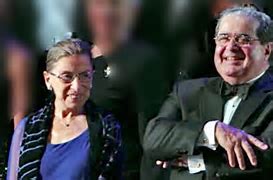The following homily was preached on September 23, 2020, being Wednesday after the Sixteenth Sunday after Pentecost, at the Daily Chapel service at Saint James School in Hagerstown, Maryland.
Reading: Psalm 119:105-108
Collect of the Day: Grant us, Lord, not to be anxious about earthly things, but to love things heavenly; and even now, while we are placed among things that are passing away, to hold fast to those that shall endure; through Jesus Christ our Lord, who lives and reigns with you and the Holy Spirit, one God, for ever and ever. Amen.
“Your word is a lamp to my feet and a light to my path.”—Psalm 119.105
In the Name of God the Father, God the Son, and God the Holy Ghost. Amen.
These past several days, the United States of America has been paying tribute to Ruth Bader Ginsburg, who was an Associate Justice of the United States Supreme Court from 1993 until her death this past Friday at the age of eighty-seven. The second of now only four women ever appointed to the Court, Ginsburg became one of its most progressive jurists, becoming well-known for her passionate and expressive dissents in numerous legal cases. This arose for her the nickname “the Notorious R.B.G.,” a reference to the late Christopher George Latore Wallace’s stage name, “the Notorious B.I.G.,” a rapper (whose music, I’m sure, some of you are aware) who, like Ginsburg, was also from Brooklyn, New York. To borrow the words of the Chief Justice of the United States, John Roberts, Ginsburg was a “brave and compassionate” legal scholar whose “life was one of the many versions of the American dream.”
In addition to the impact that her twenty-seven-year tenure had on the Supreme Court, another aspect that has been highlighted from those years has been the unlikely friendship she had with another of the Court’s late Associate Justices, Antonin Scalia. Unlike Ginsburg, who was very progressive, Scalia, nicknamed “Nino,” is regarded as being one of the Court’s most conservative jurists. To read their opinions throughout their years on the Court is to see two very different visions of the law. Yet, despite their legal and ideological differences, they became best friends, enjoying a mutual love of the opera and for traveling and their families often going out to dinner together.
When news of Ginsburg’s death broke, Christopher Scalia, the late Justice Scalia’s son, recalled a story when Judge Jeffrey Sutton was one day leaving Justice Scalia’s Court chambers and his father had pointed to two dozen roses that he needed to take down to Ginsburg, as it was her birthday. “Wow,” Sutton said, “I doubt I have given a total of twenty-four roses to my wife in almost thirty years of marriage.” “You ought to try it sometime,” Scalia replied. Sutton, unwilling to let Scalia have the last word, pushed back: “So what good have all these roses done for you? Name one five-four case of any significance where you got Justice Ginsburg’s vote.” “Some things are more important than votes,” said Justice Scalia. Christopher Scalia said that his father had the last word.[1]
As I have mentioned before, Saint James this year has committed itself to discussing issues of diversity, equity, and inclusion. Many people automatically think of such issues from either a racial standpoint or from that of sexual orientation. But there are other aspects of diversity, equity, inclusion that deserve to be highlighted. One of those other aspects is intellectual diversity. From the outside looking in, many people would think it impossible for Ginsburg and Scalia to get along. But they did and rather famously. There was an openness of mind that they each intentionally had toward the other. They recognized that “some things [were] more important than votes.” Respect for others and honoring the contributions our differences make to who we are as a community—that is more important than votes. With that recognition, Ruth Bader Ginsburg and Antonin Scalia became the model of friendship and collegiality that we all should strive to have with others. Theirs was truly a beautiful friendship.
We heard today read a portion of Psalm 119, the longest Psalm in the Bible. Throughout this Psalm are references to the goodness of God’s law, which is said to be rooted in love and to give life. “Your word is a lantern to my feet and a light upon my path,” the Psalmist says (Psalm 119.105). What made Ginsburg and Scalia’s friendship work and an amazing witness to us all was that they both, in their own respective way, viewed the law as something meant to build up others and promote the general welfare of all people. It was never just about them, but for the benefit of all people. Ginsburg and Scalia, the unlikeliest of friends, showed us that diversity, equity, and inclusion can and does work and that when we have open hearts and minds towards others, we all benefit.
That is what we should all strive for. “I have sworn and am determined to keep your righteous judgments…Accept, O LORD, the willing tribute of my lips, and teach me your judgments” (Psalm 119.106, 108). Respect of others and mutual flourishing—in them we find joy and exultation and, in the process, become better at being ourselves. Like Ruth Bader Ginsburg and Antonin Scalia modeled in their friendship with each other, as the old song says, “Let there be peace on earth and let it begin with me.”
In the Name of God the Father, God the Son, and God the Holy Ghost. Amen.
[1] Christopher J. Scalia, Tweet on September 19, 2020, Twitter.


Leave a comment